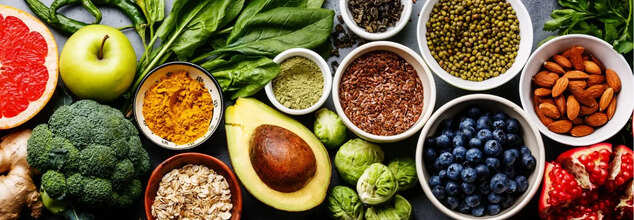- Health Conditions A-Z
- Health & Wellness
- Nutrition
- Fitness
- Health News
- Ayurveda
- Videos
- Medicine A-Z
- Parenting
- Web Stories
These Are 6 Best Foods For Women Trying To Get Pregnant

Credit: Canva
Fertility is impacted by a lot of factors, including nutrition, lifestyle and medical conditions. What you eat particularly impacts your chances of getting pregnant. There are certain nutrients and compounds, like antioxidants, which can impact your fertility by supporting hormone production, cellular function, and overall reproductive health.
Protein Rich Foods
Protein is essential for cell repair and growth, making it a key component in fertility-focused diets. Nutritionists recommend consuming protein-rich foods such as salmon, grass-fed meats, pastured eggs, organic nuts, seeds, and beans. These foods contribute to hormone balance, blood sugar stability, and mitochondrial function, all of which are vital for reproductive health.
Omega-3 Powerhouses
Nuts and seeds, particularly walnuts and flaxseeds, are excellent plant-based sources of omega-3 fatty acids. Dietitian Anderson-Haynes highlights their role in reducing inflammation and enhancing blood flow to the uterus. These nutrient-dense foods can easily be added to oatmeal, salads, smoothie bowls, or trail mixes for a fertility-boosting diet.
Antioxidant-Rich Fruits
Berries and grapes are packed with anthocyanins, plant pigments known for their anti-inflammatory properties. These compounds help improve blood circulation by dilating blood vessels, which can benefit reproductive health. Other antioxidant-rich options like leafy greens, beets, and sweet potatoes should also be consumed as they enhance egg and sperm quality by neutralizing environmental toxins.Dark Leafy Greens
Folate (vitamin B9) is critical for DNA and protein synthesis and is essential for preventing birth defects and miscarriage. Anderson-Haynes advises including folate-rich vegetables such as spinach, lettuce, and collard greens in daily meals to support fertility and a healthy pregnancy.
Avocados
Avocados provide monounsaturated fats, potassium, vitamin B6, and fiber—nutrients essential before and during pregnancy. A 2017 study highlights their role in supporting hormonal production and cellular function. Raupp suggests incorporating a variety of healthy fats, including olive oil, ghee, coconut oil, and full-fat dairy (if well-tolerated), to optimize reproductive health.
UV-Treated Mushrooms
Vitamin D plays a significant role in fertility and maternal health. UV-treated mushrooms are a valuable plant-based source of this nutrient. A 2022 study in obstetrics and endocrinology found that adequate vitamin D levels positively impact both male and female fertility, influencing in vitro fertilization (IVF) outcomes.
Here Are Other Lifestyle Factors That Support Fertility
While diet is essential, lifestyle choices also play a crucial role in reproductive health. Experts recommend:
- Prioritizing sleep: Ensuring adequate rest supports hormonal balance. It is pivotal to maintaining a good reproductive health.
- Staying active: Regular physical activity enhances circulation and metabolic health.
- Managing stress: Mindfulness, meditation, and relaxation techniques can lower stress levels that may affect fertility.
- Maintaining a healthy weight: Excess body fat can disrupt hormone production, impacting fertility.
- Avoiding alcohol: Reducing alcohol intake can help regulate reproductive hormones like estrogen and testosterone.
- Minimizing exposure to endocrine disruptors: Found in plastics, cookware, cleaning supplies, and personal care products, these chemicals can interfere with hormonal function.
- Raupp underscores the importance of choosing non-toxic, organic food and personal care products to improve fertility and pregnancy outcomes.
This Juicy Fruit Might Actually Lower Your Diabetes Risk And Improve Insulin Sensitivity

(Credit-Canva)
High blood sugar is a concerning matter because if a person has consistently high numbers for it, they may find themselves on the way to a pre-diabetic diagnosis or even diabetes. While there may not be apparent signs, high blood sugar silently causes harm to your body, and this is not a rare issue. In 2021, the Centers of Disease Control and Prevention 11.6%, which is 38.1 million people have diabetes and 8.7 million adults aged 18 or older were not aware or did not report having diabetes.
So, for those who are health conscious and wish to keep their health in check, they avoid unhealthy foods, even if they are natural. These perceived unhealthy foods are often sweet fruits like mangoes. However, a new study suggests that mangoes may have the opposite effect on this!
Are Mangoes Good for Your Health?
According to a new study published in the Nutrients journal, found that eating fresh mango every day could help your body use insulin better and manage your blood sugar levels. The best part? It did this without causing any weight gain.
Researchers mentioned that adding fresh mangoes to your diet can be an easy and enjoyable way for people who are overweight or obese to improve their insulin function and lower their risk of getting type 2 diabetes.
The study involved men who were overweight or obese. They were split into two groups: one ate two cups of fresh mango daily for a month, while the other ate a similar amount of mango-flavored Italian ice. Both groups took a sugar tolerance test at the beginning and end of the study. After the study, the men who ate fresh mango showed several good changes in their health:
- Their fasting insulin levels were lower.
- Their insulin resistance improved, meaning their bodies responded better to insulin.
- They had better control over their blood sugar levels.
This improvement in insulin use without weight gain in the mango group is important. It helps clear up misunderstandings about mango's natural sugar and its effect on weight and diabetes. These findings also support earlier research showing that eating mango doesn't lead to weight gain. While we don't know the exact reason yet, improved antioxidant levels from mango might be helping with blood sugar control.
How Can Mangos Help Manage Blood Sugar?
Mangoes are naturally sweet, which has led some to question their sugar content and how it might affect weight, especially for people who have insulin resistance but this new study, along with previous research, confirms that concerns about weight gain from eating mango are not true. People with insulin resistance don't need to worry about regularly including mangoes in their diet.
In fact, it might be the opposite, researchers believe that the fiber, antioxidants, and special plant compounds found in mangoes could help prevent sudden rises in blood sugar and make cells respond better to insulin.
For example, fiber slows down digestion. This means sugar isn't absorbed into your body too quickly, which helps keep blood sugar levels steady. Mangoes also have important vitamins like A and C, plus minerals like potassium and magnesium, all of which support your body's overall metabolism.
Should You Eat Mango Every Day?
Even though this study was small and more research is needed, experts agree that mango is a healthy fruit to add to your diet. It's full of vitamins, antioxidants, and fiber.
The positive effects seen when people regularly ate mangoes might not just be because it's a fresh fruit, but because of its unique mix of nutrients.
That said, eating two full cups of mango every day might not be practical for everyone. Instead, it's best to enjoy mangoes as part of a varied diet, perhaps by eating them with or alternating them with other fruits, vegetables, lean proteins, and whole grains.
Scientists Reveal The Foods That Slash Your Risk Of Memory Loss By 80%—Are You Eating Them?

Credits: Canva
Forgetting your keys once can be frustrating but forgetting them over and over—or forgetting the name of a good friend—may raise an unsettling question: Is this normal aging or more? For almost 1 in 3 adults age 65 and older, these little changes in memory and thinking are usually early symptoms of Mild Cognitive Impairment (MCI)—a condition that can lead to dementia or Alzheimer's disease. But there is fresh hope. Researchers have discovered that a high-antioxidant diet may cut the risk of MCI by as much as 80%.
That's correct—more than you may have thought, what you eat on your plate can help maintain your brain function. Mild cognitive impairment (MCI) occurs in almost one-third of individuals aged 65 and older, a subtle but important change in thinking and memory abilities that can develop into dementia, including Alzheimer's disease. Although there is no treatment for these conditions, an increasing amount of research is identifying lifestyle modifications that could have neuroprotective effects on the aging brain—and diet is the leading candidate.
A recent paper in the journal Nutrients has been making headlines by putting numbers to how effective dietary antioxidants might be in defending the brain. Scientists examined the diet and cognition of older people, and the connections between antioxidant food intake, alcohol intake, and risk of developing mild cognitive impairment.
People who had a higher antioxidant index score were much less likely to have MCI. Indeed, risk fell by as much as 80% in those with antioxidant-filled diets but there was a catch—the cognitive-enhancing effect only benefited non-drinkers.
Among individuals who drank alcohol—one or two drinks per week—a protective effect of antioxidants was lost. Alarming, those with light-to-moderate drinking had over double the risk of MCI compared to abstainers.
The findings were dramatic: those with the highest antioxidant index scores had a risk of MCI that was as much as 80% lower than that of those with the lowest scores. This observation lends further credence to decades of research suggesting that antioxidants—molecules in plentiful supply in bright-colored fruits, vegetables, nuts, and whole grains—play a key role in protecting the brain against oxidative stress that leads to decline.
What Are Antioxidants, Really?
Antioxidants are food chemicals that occur naturally and aid in neutralizing free radicals—unstable molecules that harm cells and lead to disease and aging, including loss of mental functioning. The most typical antioxidant nutrients are vitamin C, vitamin E, beta-carotene, selenium, and zinc.
They’re abundant in whole, colorful foods—think leafy greens, berries, nuts, and whole grains. But they don’t work in isolation. It’s the synergy of nutrients within whole foods that delivers the most potent effect.
And that’s what makes food so powerful compared to supplements. You’re not just getting a single antioxidant—you’re getting a full spectrum of phytochemicals that support one another.
What Is The Problem with Alcohol?
The antioxidant hype over red wine has been around for decades, but the new study turns that hypothesis on its head. By the research, any drinking at all, even light drinking, doubled the risk for having MCI.
While the exact mechanism isn’t fully understood, alcohol can interfere with the absorption and metabolism of key nutrients. It also increases inflammation and oxidative stress—the very processes antioxidants aim to reduce. Essentially, alcohol may cancel out the very brain-protective effects you’re trying to gain from a healthy diet.
The researchers noted that although their results are intriguing, one has to take them with a grain of salt. This was a cross-sectional study, so it indicates correlation—not cause. And because the nutritional information was self-reported, there could be some error in participants' memories for what they consumed or imbibed.
Nevertheless, the trend is obvious: an alcohol-free, high-antioxidant lifestyle seems to be highly correlated with enhanced brain function in seniors.
It should be noted that this study was cross-sectional, so it only measured associations at one moment in time and did not establish cause and effect. The food intake information was self-reported, which can lead to errors, and the study didn't separate between types or quantities of liquor consumed. Nevertheless, the results support an increasing consensus among diet and brain health professionals: what you eat has a big impact on cognitive longevity.
What to Eat for Cognitive Protection?
To get sharper and lower your risk of cognitive decline, diversify your diet with whole foods that are rich in antioxidants. These are some expert-approved powerhouses to put on your list:
Leafy greens (such as spinach and kale): Magnesium and vitamin E-rich, they promote neurological well-being.
Berries and citrus fruits: Vitamin C-rich, they shield brain cells from oxidative stress.
Carrots, sweet potatoes, squash: Packed with beta-carotene and vitamin A, protecting vision and cognition.
Nuts and seeds: Sunflower seeds and almonds are good sources of vitamin E and selenium—essential nutrients for cognitive health.
Whole grains and legumes: Rich in magnesium and zinc, both critical to brain function.
Small changes amount to a lot. Sprinkle sunflower seeds over a salad, replace chips with a handful of almonds, or add a spoonful of spinach to your smoothie. These tiny tweaks to your meals might mean significant gains in the long run.
Easy Ways to Increase Your Antioxidant Intake
Contrary to the idealized idea of a daily glass of wine being "good for the heart" or "full of antioxidants," the science keeps mounting against it. Not only is alcohol not adding any necessary nutrients to your body, but it actually can be speeding up aging in your brain and body as well.
Rather than relying on artificial antioxidants with hidden expenses—such as fruit salads, herbal teas, or smoothies—choose natural ones. These provide the same (or superior) benefits without compromising cognitive function. Incorporating more antioxidant-rich foods into your regimen does not need to involve drastic change. Small, sustainable modifications can have lasting impact:
- Mix a handful of berries into your morning oatmeal or yogurt.
- Mix leafy greens into smoothies or salads.
- Munch on seeds and nuts rather than packaged chips or crackers.
- Make sweet potatoes or squash a foundation for stews and soups.
- Top salads or roasted vegetables with sunflower seeds.
Variety is essential, the greater the diversity of colors and varieties of plant foods that you consume, the wider range of antioxidants and phytochemicals you will ingest.
This new study contributes to a mounting pile of evidence that diet is an influential, changeable component in the battle against cognitive impairment. Though genetics and other issues are at work, what you do daily—what you eat, how active you are, and how you handle stress—is capable of shielding your brain as you get older.
Experts suggest emphasizing a balanced, plant-based diet with ample antioxidants, healthy fats, and whole grains. Alcohol avoidance or moderation is also important. These practices, along with regular exercise and mental activity, are the building blocks of a brain-healthy lifestyle.
Although genetics and age are things we can't control, diet is something we have control over. This new research corroborates the increasing evidence that diets rich in nutrients and antioxidants may protect against cognitive deterioration, particularly when paired with an alcohol-free life.
Diagnostic Anomaly: If You Have This Disease, Your Body Will Forget To Tell You 'I Am Full'

Credits: Canva and AI-generated image
'Diagnostic Anomaly' is a Health And Me Series, where we dive deep into some of the rarest of rare diseases. Here, we trace such diseases and what causes them. We also try to bring case studies around the same.
It begins quietly. A newborn, a bit more limp than others, doesn’t cry much. Feeding is a challenge — not because the baby refuses, but because their muscles are too weak to suck. Doctors may call it hypotonia. Parents, unaware of what’s to come, might just think their baby is a little “slow to start.” But beneath the surface of that fragile life could lie Prader-Willi syndrome (PWS) — a rare genetic enigma that transforms the body’s basic drives into lifelong challenges.
A Rare Genetic Disease
Prader-Willi syndrome affects between 1 in 10,000 to 1 in 30,000 people globally, with about 10,000 to 20,000 Americans living with the disorder today. This complex, multisystem condition affects both males and females equally and doesn’t discriminate by race or ethnicity. What makes it even more mysterious is that most cases happen randomly — they’re not inherited from parents but arise due to spontaneous genetic errors in early development.
Only in rare circumstances does the syndrome run in families.
The Genetic Trap on Chromosome 15
To understand Prader-Willi, you have to venture deep into chromosome 15, specifically a segment called 15q11.2-q13 — also referred to as the PWS/AS region (shared with Angelman syndrome). Human cells carry two copies of each non-sex chromosome, one from each parent. But not every gene on both copies is active. Through a process known as genetic imprinting, some genes are silenced depending on whether they came from the mother or the father.
In PWS, the active paternal genes on chromosome 15 are missing or silenced, and since the maternal copies are always naturally “switched off”, this leaves the person without a functional set of those genes.
In 60–70% of cases, a random deletion wipes out this crucial paternal region.
In 30–40%, individuals inherit two maternal copies, with no paternal copy at all.
Rarely, mutations, epigenetic changes, or chromosomal translocations disrupt the gene function.
A Syndrome with Two Extremes
The hypothalamus, the brain’s master hormone regulator, is the primary site of impact. It governs hunger, body temperature, hormones, and sleep — all functions affected in PWS.
Infancy: The Quiet Beginning
Newborns with PWS often exhibit:
- Hypotonia ("floppiness")
- Poor sucking reflex, resulting in difficulty feeding and slow weight gain
- Low movement in the womb before birth
- Distinctive facial features: almond-shaped eyes, thin upper lip, narrow head
Childhood: A Metabolic Flip
Around ages 2 to 8, the script flips. The same child who once struggled to eat now faces insatiable hunger. The term is hyperphagia — an uncontrollable urge to eat that leads to obesity and complications like:
- Type 2 diabetes
- Heart disease
- Gastrointestinal issues
Children with PWS often never feel full, no matter how much they eat. This unrelenting hunger stems from hormonal dysregulation and altered reward systems in the brain.
Additional symptoms include:
- Short stature due to growth hormone deficiency
- Cognitive impairment (mild to moderate)
- Genital underdevelopment
- Sleep disturbances
- Nearsightedness
- Underactive thyroid
- In some, fair skin and light hair due to pigment gene (OCA2) deletion
Managing the Unmanageable
There is no cure for Prader-Willi syndrome, but with care, individuals can live into their 70s. Without intervention, complications from obesity can reduce lifespan to the 40s.
Early Interventions
- High-calorie formulas and tube feeding help overcome early feeding difficulties.
- Hormone therapy (growth hormone, testosterone, estrogen) supports physical development.
- Physical, speech, and occupational therapy assist in motor and cognitive development.
New Hope for Hyperphagia
In 2025, the FDA approved the first medication specifically targeting hyperphagia in PWS for children aged 4 and older. The drug's mechanism is unclear, but it may reduce hunger signals from the hypothalamus.
Ethical Complexity and Lifelong Vigilance
Families must enforce strict dietary control and secure food environments. Mayo Clinic experts recommend customized nutrition plans, often designed with help from a dietitian. In some households, food must be locked away to prevent bingeing.
Psychiatric symptoms, including psychosis in adolescence or adulthood, may also require medical management.
© 2024 Bennett, Coleman & Company Limited

